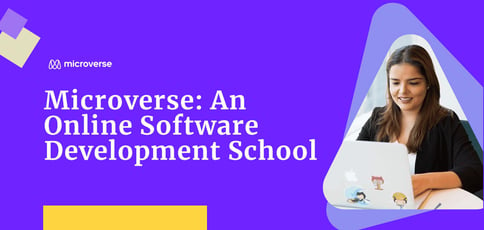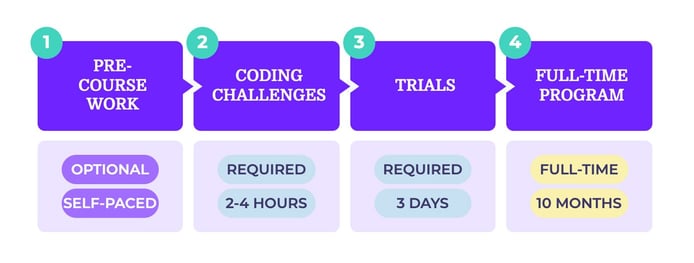
TL; DR: Microverse is an online school for remote software developers worldwide, and its students pay no fees until they find a job after completing the program. The school offers a rigorous and supportive peer-to-peer learning environment. Students learn through more than 1,000 hours of remote pair programming and real-time collaboration. Microverse receives student applications from more than 200 countries, and alumni have increased their salaries up to 10 times after completing the full-time program.
The COVID-19 pandemic has driven what McKinsey calls “a radical reworking of work.” Digital transformation plans have accelerated from trials within months to going live in weeks as enterprises scramble to reconfigure their processes and operations to prepare for the unknowns of a post-pandemic world.
The urgency of those changes has worsened an already critical tech skills shortage in developed countries. And it has compelled organizations to rethink how they recruit the IT specialists they need.
That means employers now search far beyond their national boundaries for talent. The term offshore talent — or anywhere employees — once defined tech professionals who opted to work remotely for employers who could be a continent away.
Traditionally, such workers are likely to live in developed countries. But IT talent in developing countries often can’t access the education, training, and experience to make them eligible applicants for those remote positions.
Ubiquitous internet access, and the COVID-19 pandemic, have disrupted that dynamic. And if people now have the means to work remotely, they can also learn in-demand skills remotely. That’s why the team behind Microverse developed a more innovative and inclusive approach to online learning in 2018.

Microverse, an online school for remote software developers, offers students based anywhere in the world a software skills study program that lasts about 10 months. And learners pay no fees until they complete the program and find paid employment.
The school provides a supportive peer-to-peer learning environment for professional and global-minded software developers. Microverse students learn through more than 1,000 hours of remote pair programming and real-time collaboration.
The San Francisco-based school has received applications from people in more than 200 countries, and it aims to train and place 1 million students by 2030.
“Learning to code on your own can be lonely and difficult,” said Ariel Camus, Founder and CEO at Microverse. “Our remote students join one of the most collaborative, social learning communities in the world.”
Unique Approach Aims to Promote Latent Tech Skills
Ariel was raised in Argentina and went to school in Europe. He built a business in San Francisco, taught in Africa, and lived in Asia for a year. Those experiences give him a unique perspective on the global employment market.
“In my life’s journey, I’ve seen that talent is everywhere, but opportunity is not,” he said. “The Internet makes it possible for anyone to connect with global jobs regardless of where they were born or live, but paying for a great education is incredibly difficult for most people.”
Ariel said he founded Microverse to change that and help people worldwide learn software development at no cost upfront and help connect them with jobs on the global market when they finish.
IT skills-strapped companies may miss out on tech talent because they overlook Latin America, Eastern Europe, Africa, and Asia as potential candidate pools.
“Technology now allows us to hire people from any part of the world,” he added. “They can all be part of an employer’s corporate culture, and they can all be part of solving the massive problems that global economies currently face.”
Microverse operates with a fully remote and global team and has workers based in more than 12 countries.
“We have no classrooms, and we have no teachers. Our students learn as real developers learn: by coding and collaborating,” Ariel said. “They spend almost the entire day meeting, collaborating, and getting support from co-students around the world.”
Helping Students Find Jobs After They Finish the Program
Microverse students learn using an approach called pair programming. Two students learn together and collaborate with other students in real time, just as they would if they were working on a distributed team at a real company.
“Our approach to learning not only provides students with an accountability partner and global support network but also helps students learn remote workflows and acquire the collaboration and communication skills necessary to join a global company,” said Ariel.

Microverse’s role goes beyond the educational processes. After students complete its technical curriculum, the school helps them improve their portfolio, résumé, and online presence. It also assists them with job applications and interviews.
“We help them find and apply to competitive jobs which entail remote working around the world and are involved in the negotiation of job offers,” Ariel said.
Another aspect that distinguishes Microverse is that its students enter the job market trained in soft skills that will enable them to join remote teams. Those skills include learning how to work independently, make decisions, and collaborate remotely.
Microverse’s training program is designed specifically for people who want international remote work careers, not just proven tech skills.
“That gives them an edge in the jobs market because they gain hundreds of hours of experience in working remotely with many people from other parts of the world — and in a highly professional setting,” said Ariel. “That allows them to integrate well into companies and start adding value to their jobs from the very start.”
Support Roles Help Students Succeed with Rigorous Learning Program
Microverse makes it clear that the full-time program is more rigorous and intense than full-time programs at most other schools. Students may spend 8 to 10 hours a day, five days a week, learning challenging material and following a holistic, deadline-driven curriculum.
Students who lack previous coding experience should spend additional time to keep pace with the program.
Microverse provides a range of support options to its students to help them through the challenging regimen. During the program, each student is paired with other students at the same point in the curriculum.

“We have two kinds of partners: learning partners and coding partners,” said Ariel. “With learning partners, students learn together and check in daily while working solo on their projects. With a coding partner, students learn together through remote pair programming for about seven hours a day on project-building days.”
Partners help keep each other motivated throughout their work and are supportive when one gets stuck on a task. Microverse students will change partners many times throughout the program, giving them opportunities to work with a diverse range of people from all over the world.
Other student support roles include the stand-up team (a core support group), a mentor ( champion within Microverse), and code reviewers. These Microverse students help their peers achieve their ultimate potential as software developers.
“Student coders mainly interact with code reviewers during code reviews, as every project they submit will have to pass their checks before it can be submitted as complete,” Ariel said. “Code reviewers help you to make sure you are producing industry-standard code from day one by reviewing your submission and providing feedback.”
Microverse: 90% of Graduate Students Hired Within Six Months
Microverse’s role as an online resource is not confined to educational processes. After students complete the core curriculum, the school assigns them a career coach. The coaches are professionals who work alongside students to prepare them to join the job market and help them find a position that is a good match for their skills and aptitudes.
According to Microverse, more than 90% of its alumni get hired within six months of starting their job search. And not all of those jobs are remote as businesses also recruit students for on-site positions.
“We estimate the average student to have an additional income of $500,000 during their life as a result of going through Microverse,” said Ariel.
The emphasis on persistent application and group support dynamics may not work for every web builder and software engineer. But that is why Microverse focuses on accepting only self-driven learners with a growth mindset and great collaboration skills prepared to commit to the journey.
“The Microverse experience centers around accountability, support, and community. Our students learn in an environment that mimics a real-world remote workspace,” Ariel said. “Until they graduate, they are expected to follow the full-time daily schedule, and failure to do so could lead to expulsion. Sure, this is certainly an intense learning experience, but it is as intense as it is life-changing.”
HostingAdvice.com is a free online resource that offers valuable content and comparison services to users. To keep this resource 100% free, we receive compensation from many of the offers listed on the site. Along with key review factors, this compensation may impact how and where products appear across the site (including, for example, the order in which they appear). HostingAdvice.com does not include the entire universe of available offers. Editorial opinions expressed on the site are strictly our own and are not provided, endorsed, or approved by advertisers.
Our site is committed to publishing independent, accurate content guided by strict editorial guidelines. Before articles and reviews are published on our site, they undergo a thorough review process performed by a team of independent editors and subject-matter experts to ensure the content’s accuracy, timeliness, and impartiality. Our editorial team is separate and independent of our site’s advertisers, and the opinions they express on our site are their own. To read more about our team members and their editorial backgrounds, please visit our site’s About page.



